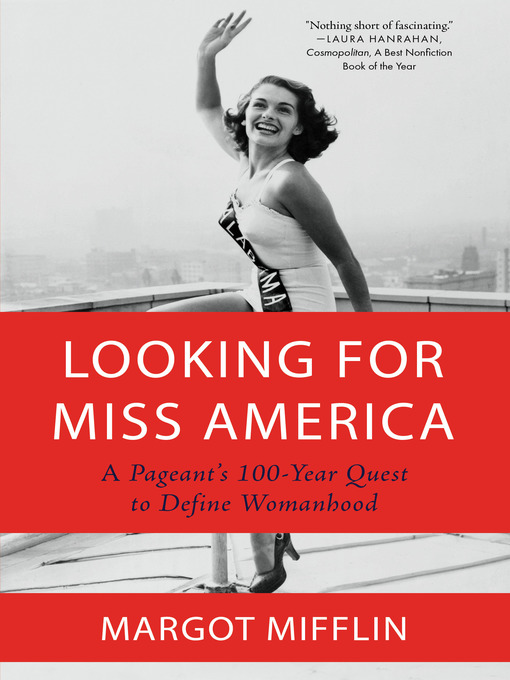Review by Booklist Review
Just a year after the Nineteenth Amendment passed, another group of sash-wearing women were in the spotlight, this time in the first Miss America pageant. Designed to draw business to the growing resort town of Atlantic City, the Miss America pageant has faced protests and scandal (and an unfair association with the Trump-owned Miss USA), all while attempting to define the ideal of American beauty and womanhood. Mifflin traces the history of what began as a "bathing beauty revue" but which, since 2018, no longer has a swimsuit element. This perfectly demonstrates the tension of the pageant--judging women on criteria that are, in some ways, a backlash to feminism's rejection of "traditional" gender roles, while offering the winner an "empowering" scholarship prize. Its definition of ideal womanhood was also exclusively white, a fact that was finally uncodified in 1950, though the first Black contestant didn't compete until 20 years later (Miss Iowa, Cheryl Browne). Though she explores the serious failings of the contest, Mifflin also relishes the nostalgia and camp associated with Miss America, making this social history a perfect summer read. Women in Focus: The 19th in 2020
From Booklist, Copyright (c) American Library Association. Used with permission.
Review by Publisher's Weekly Review
Mifflin (Bodies of Subversion), an English professor at Lehman College, intertwines the histories of the Miss America pageant and American feminism in this vigorously researched and wryly humorous account. Over the past century, Mifflin contends, the pageant--which began in Atlantic City in 1921--has exemplified social tensions over gender, sexuality, race, and ethnicity. She notes that one early contestant was arrested on the beach for wearing the same "sea togs" she'd worn on stage the day before; that African-American women were officially excluded from the competition until the 1950s; and that only one Jewish woman has ever won. As the contest evolved from crowning "the girl next door" to anointing the "biggest glampots," Mifflin writes, the addition of a scholarship program tried to "cover the skin show with the fig leaf of a diploma." Mifflin profiles famous contestants (Bess Myerson, Gretchen Carlson, and Vanessa Williams) in depth, but also allows less-familiar names, including Yolande Betbeze, whose refusal to participate in the swimsuit portion of the contest led to the creation of the rival Miss USA pageant, to take center stage. This incisive and entertaining history deserves the spotlight. Agent: Linda Chester, the Linda Chester Literary Agency, (Aug.)
(c) Copyright PWxyz, LLC. All rights reserved
Review by Library Journal Review
Beauty pageants have long been a topic of research and wide interest, and Mifflin's (Bodies of Subversion) work offers excellent content and historical analysis to this ongoing discussion. The book focuses not on pageantry in general, but instead specifically analyzes the 100-year-history of the Miss America pageant, since its founding in Atlantic City in 1921. This narrower focus allows the author to share personal stories of winners and contestants, and helps readers to better understand how the institution evolved under various leaders and reacted to societal shifts throughout the 20th and 21st centuries. Many events will be familiar to even casual observers of American culture--such as the notorious "bra burning" protests and the moment that winner Vanessa Williams was forced to resign--but Mifflin situates these events in the pageant's historical context, allowing for a better understanding of their cultural impact. While deftly commenting on the racism and sexism that have characterized the pageant's history, she also makes space for the contestants to speak openly for themselves about their own experiences, something pageants themselves are not known for. VERDICT This work offers a thought-provoking, balanced, and highly informative look at an institution that has perplexed and enticed Americans since its founding.--Sarah Schroeder, Univ. of Washington Bothell
(c) Copyright Library Journals LLC, a wholly owned subsidiary of Media Source, Inc. No redistribution permitted.
Review by Kirkus Book Review
The Miss America program heads toward its second century still trying to shed its image as a "leg show" or "cheesecake with a side of culture." Journalist Mifflin offers a lively and probing appraisal of a pageant that will observe its centennial in 2021. Drawing on research that includes interviews with former Miss Americas from different eras, this well-balanced account shows that while the program has helped many contestants envision futures beyond their hometowns, it has always had unsavory aspects at odds with its organizers' efforts to invest it with a wholesome image. The most egregious of these, formally adopted in 1940 and in effect until the 1950s, required contestants to be "in good health and of the white race." Fresh troubles hit in later decades as feminists' protests and expanding women's rights made the program look out of touch. Organizers tried to adapt by killing the swimsuit competition (2018) and having each contestant choose a "social issues platform" to promote (1990). Still, the TV ratings tanked, the number of entrants plunged, and the pageant CEO was forced out after emails surfaced showing that he had "slut-shamed" contestants. Perhaps the most disturbing fact in this book is that since 2007, entrants have had to engage in what Kate Shindle, Miss America 1998, calls "pay to play." Each contestant "must raise a minimum amount--by soliciting donations--to compete," and while some of the proceeds go to children's hospitals, much of it goes to pageant scholarships, so that "contestants themselves have funded 85 percent of Miss America's scholarships." Mifflin relates all of this without descending into ridicule or screed and with a keen sympathy for both the costs and benefits to entrants. Whether fans or foes of Miss America, few readers will see the pageant in the same way after finishing this book. A cleareyed look at an iconic beauty pageant and its efforts to stave off irrelevance. (16-page color insert) Copyright (c) Kirkus Reviews, used with permission.
Copyright (c) Kirkus Reviews, used with permission.

